I speak from the deep end of night.
Of end of darkness I speak.
I speak of deep night ending.
– From “The Gift” by Forugh Farrokhzad
The winter 2023 series of the MEP Literature Group focuses on Iranian women writing since the 1978-79 Revolution whose stories are set inside Iran. We have compiled a reading list from an essay by Niloufar Talebi, “100 Essential Books by Iranian Writers: An Introduction & Nonfiction,” published on the Asian American Writers’ Workshop website. As we read, one question we will keep in mind is that posed by Talebi: How does the publishing market limit Americans’ understanding of Iranian efforts?
Over nine weeks we will read three novels set from the 1920s to the present: The Gardens of Consolation, by Parisa Reza; Women Without Men, by Shahrnush Parsipur; and Man of My Time, by Dalia Sofer. In Part II, our spring session, we will begin with a novel set in 1979 and end with a novel set in contemporary Iran.
We meet on Thursday evenings, 7-8:30 pm US EST, and we will be reading approximately 100 pages per week.
Part I
Week 1 – Introduction, reading of poems from Solmaz Sharif, Look
Week 2, 3, 4 The Gardens of Consolation
Weeks 5, 6 Women Without Men
Weeks 7, 8, 9 Man of My Time
Part II
Weeks 10, 11 The Man Who Snapped His Fingers
Weeks 12, 13, 14 The Enlightenment of the Greengage Tree
Weeks 15, 16, 17 trans(re)lating house one
Weeks 18, 19 In Case of Emergency, summary of sessions
Part I
1920s Iran
The Gardens of Consolation by Parisa Rexa
Translated by Adriana Hunter. Europa Editions. 272 pages, 2015
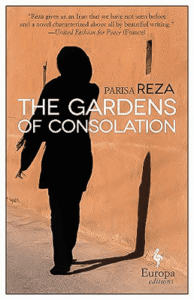 In the early 1920s, in the remote village of Ghamsar, Talla and Sardar, two teenagers dreaming of a better life, fall in love and marry. Sardar brings his young bride with him across the mountains to the suburbs of Tehran, where the couple settles down and builds a home. From the outskirts of the capital city, they will watch as the Qajar dynasty falls and Reza Khan rises to power as Reza Shah Pahlavi.
In the early 1920s, in the remote village of Ghamsar, Talla and Sardar, two teenagers dreaming of a better life, fall in love and marry. Sardar brings his young bride with him across the mountains to the suburbs of Tehran, where the couple settles down and builds a home. From the outskirts of the capital city, they will watch as the Qajar dynasty falls and Reza Khan rises to power as Reza Shah Pahlavi.
Into this family of illiterate shepherds is born Bahram, a boy whose brilliance and intellectual promise are apparent from a very young age. Through his education, Bahram will become a fervent follower of reformer Mohammad Mosaddegh and will participate first-hand in his country’s political and social upheavals.
1953 Iran
Women Without Men, by Shahrnush Parsipur
Preface by Shirin Neshat, Feminist Press at CUNY. 194 pages, 1989
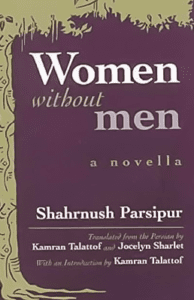 This modern literary masterpiece follows the interwoven destinies of five women—including a wealthy middle-aged housewife, a sex worker, and a schoolteacher—as they arrive by different paths to live together in an abundant garden on the outskirts of Tehran. Drawing on elements of Islamic mysticism and recent Iranian history, this unforgettable novel depicts women escaping the narrow confines of family and society, and imagines their future living in a world without men.
This modern literary masterpiece follows the interwoven destinies of five women—including a wealthy middle-aged housewife, a sex worker, and a schoolteacher—as they arrive by different paths to live together in an abundant garden on the outskirts of Tehran. Drawing on elements of Islamic mysticism and recent Iranian history, this unforgettable novel depicts women escaping the narrow confines of family and society, and imagines their future living in a world without men.
Mid 20th Century to Present
Man of My Time, by Dalia Sofer
Farrar, Straus and Giroux, 384 pages, 2020
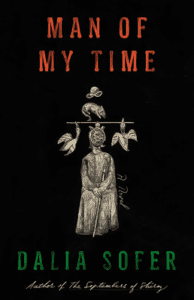 Set in Iran and New York City, Man of My Time tells the story of Hamid Mozaffarian, who after decades of ambivalent work as an interrogator with the Iranian regime, travels on a diplomatic mission to New York, where he encounters his estranged family and retrieves the ashes of his father, whose dying wish was to be buried in Iran. This is a novel not only about family and memory but about the interdependence of captor and captive, of citizen and country. Sofer is also the author of Septembers of Shiraz, which was made into a major motion picture.
Set in Iran and New York City, Man of My Time tells the story of Hamid Mozaffarian, who after decades of ambivalent work as an interrogator with the Iranian regime, travels on a diplomatic mission to New York, where he encounters his estranged family and retrieves the ashes of his father, whose dying wish was to be buried in Iran. This is a novel not only about family and memory but about the interdependence of captor and captive, of citizen and country. Sofer is also the author of Septembers of Shiraz, which was made into a major motion picture.
Part II
1979 Iran
The Man Who Snapped His Fingers, by Fariba Hachtroudi
Translated by Alison Ander. Europa Editions. 144 pages, 2014
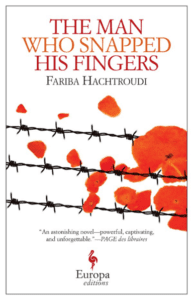 French-Iranian author Fariba Hachtroudi’s English-language debut explores themes as old as time: the crushing effects of totalitarianism and the infinite power of love.
French-Iranian author Fariba Hachtroudi’s English-language debut explores themes as old as time: the crushing effects of totalitarianism and the infinite power of love.
She was known as “Bait 455,” the most famous prisoner in a ruthless theological republic. He was one of the colonels closest to the Supreme Commander. When they meet, years later, far from their country of birth, a strange, equivocal relationship develops between them. Both their shared past of suffering and old romantic passions come rushing back accompanied by recollections of the perverse logic of violence that dominated the dictatorship under which they lived.
The Man Who Snapped His Fingers is a novel of ideas, exploring power and memory by an important female writer from a part of the world where female voices are routinely silenced.
1980s Iran
The Enlightenment of the Greengage Tree, by Shokoofeh Azar
Europa Editions), 272 pages, originally published 2017, reprint edition, 2020
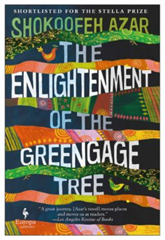 This extraordinary novel is not about external alienation, but about internal exile. Written (and translated) beautifully, this is a story of a family destroyed by the revolution even if it insulates itself in a distant village. It is a story of modernity clashing with tradition, a juxtaposition that generates all manners of supernatural beings among the characters. The novel is full of ghosts—of immediate family members, of ancestors, of shamans.
This extraordinary novel is not about external alienation, but about internal exile. Written (and translated) beautifully, this is a story of a family destroyed by the revolution even if it insulates itself in a distant village. It is a story of modernity clashing with tradition, a juxtaposition that generates all manners of supernatural beings among the characters. The novel is full of ghosts—of immediate family members, of ancestors, of shamans.
2009 Iran
trans(re)lating house one, by Poupeh Missaghi
Coffee House Press, February 2020, 296 pages, 2020
 In this debut novel, in the aftermath of Iran’s 2009 election, a woman undertakes a search for the statues disappearing from Tehran’s public spaces. A chance meeting alters her trajectory, and the space between fiction and reality narrows. As she circles the city’s points of connection—teahouses, buses, galleries, hookah bars—her many questions are distilled into one: How do we translate loss into language? Melding several worlds, perspectives, and narrative styles, trans(re)lating house one translates the various realities of Tehran and its inhabitants into the realm of art, helping us remember them anew. Missaghi is also a translator and Asymptote’s Iran editor-at-large.
In this debut novel, in the aftermath of Iran’s 2009 election, a woman undertakes a search for the statues disappearing from Tehran’s public spaces. A chance meeting alters her trajectory, and the space between fiction and reality narrows. As she circles the city’s points of connection—teahouses, buses, galleries, hookah bars—her many questions are distilled into one: How do we translate loss into language? Melding several worlds, perspectives, and narrative styles, trans(re)lating house one translates the various realities of Tehran and its inhabitants into the realm of art, helping us remember them anew. Missaghi is also a translator and Asymptote’s Iran editor-at-large.
Contemporary Iran
In Case of Emergency, by Mahsa Mohebali
Translated by Mariam Rahmani. Feminist Press at CUNY. 168 pages, 2021
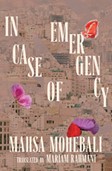 What do you do when the world is falling apart and you’re in withdrawal? Disillusioned, wealthy, and addicted to opium, Shadi wakes up one day to apocalyptic earthquakes and a dangerously low stash. Outside, Tehran is crumbling: yuppies flee in bumper-to-bumper traffic as skaters and pretty boys rise up to claim the city as theirs. Cross-dressed to evade hijab laws, Shadi flits between her dysfunctional family and depressed friends—all in search of her next fix.
What do you do when the world is falling apart and you’re in withdrawal? Disillusioned, wealthy, and addicted to opium, Shadi wakes up one day to apocalyptic earthquakes and a dangerously low stash. Outside, Tehran is crumbling: yuppies flee in bumper-to-bumper traffic as skaters and pretty boys rise up to claim the city as theirs. Cross-dressed to evade hijab laws, Shadi flits between her dysfunctional family and depressed friends—all in search of her next fix.
Mahsa Mohebali’s groundbreaking novel about Iranian counterculture is a satirical portrait of the disaster that is contemporary life. Weaving together gritty vernacular and cinematic prose, In Case of Emergency takes a darkly humorous, scathing look at the authoritarian state, global capitalism, and the gender binary
